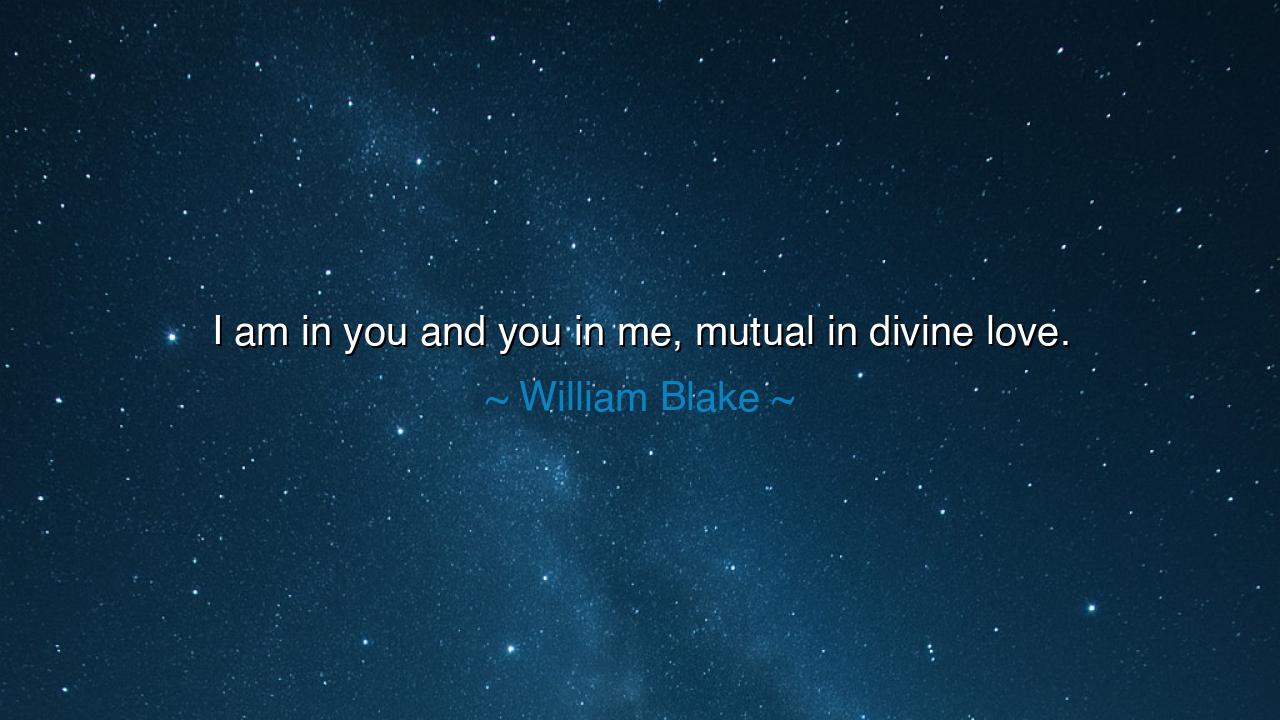
I am in you and you in me, mutual in divine love.






“I am in you and you in me, mutual in divine love.” Thus spoke William Blake, the mystic poet, the painter of visions, the prophet who saw eternity blazing within the ordinary. These words are not merely a line of poetry — they are a revelation of the oneness of all existence, the union between human and divine, between soul and soul, bound together by the eternal flame of love. In these few radiant words, Blake expresses what philosophers and saints have sought for centuries: the knowledge that we are not separate from God or from one another, but interwoven in the same living spirit.
Blake lived in an age of reason — the eighteenth century, when men placed their faith in logic and machines — yet he was a man of vision, a seer who looked beyond the surface of the world. He saw that the divine was not confined to heaven, nor chained within dogma, but alive within the heart of man. To him, love was not a sentiment, but the very energy of creation — the breath of God made visible in human form. Thus, when he wrote, “I am in you and you in me,” he spoke not of romance, but of the divine reciprocity that underlies all true relationship: the recognition that the same spark of eternity burns in every soul.
This idea of mutual indwelling — of God within man and man within God — echoes through the scriptures and mystic traditions of all faiths. In Christianity, Christ declared, “Abide in me, and I in you.” In the Bhagavad Gita, Krishna tells Arjuna, “I am the Self seated in the hearts of all beings.” And in the Sufi poetry of Rumi, one finds the same truth: “You are not a drop in the ocean; you are the entire ocean in a drop.” Blake stood among these visionaries — not as a theologian, but as a poet of revelation, proclaiming that the separation between God and humanity is an illusion born of fear. In love, that illusion dissolves, and all becomes one.
To understand Blake’s vision, consider the life of Francis of Assisi, who found God not only in prayer, but in the faces of lepers, in the song of birds, and in the whisper of wind through the trees. Francis did not seek heaven beyond the stars; he discovered it within the world, and within himself. When he called the sun his brother and the moon his sister, he was speaking Blake’s truth centuries before — that all creation shares one life, one love, one divine heartbeat. In such a state, the walls of ego fall, and only communion remains.
Blake’s words also speak to the sacred unity of human love. When two souls truly love, they do not merely touch; they merge. The lover sees the beloved not as other, but as reflection — a mirror of the same divine essence. To say “I am in you and you in me” is to proclaim the death of isolation. It is the cry of the soul that has found home — not in possession, but in union. In divine love, there is no “mine” or “yours,” no higher or lower, but a shared wholeness that transcends self. Such love does not consume; it liberates.
In this age of noise and division, Blake’s vision calls out like a bell in the fog. He reminds us that divine love is not confined to saints or mystics; it is available to every heart that learns to see beyond the surface of the world. To live “mutual in divine love” is to treat every being — friend and stranger, human and beast — as a vessel of the same sacred light. It is to look upon another and recognize oneself. This is the secret of peace, for only in this awareness can hatred dissolve and compassion arise.
So, O seekers of truth, let this wisdom take root in your soul: the divine is not apart from you, nor are you apart from it. To live in love is to live in God, and to see the divine in another is to awaken the divine within yourself. Let your heart be the temple where heaven and earth meet. Let every act of kindness, every gesture of forgiveness, every moment of wonder, become your prayer of unity.
For in the end, as Blake knew, love is not merely what God does — it is what God is. And when you love with that sacred depth, you too become part of the eternal dance: the divine in you, you in the divine, forever mutual in divine love — one heartbeat echoing through all creation.






AAdministratorAdministrator
Welcome, honored guests. Please leave a comment, we will respond soon